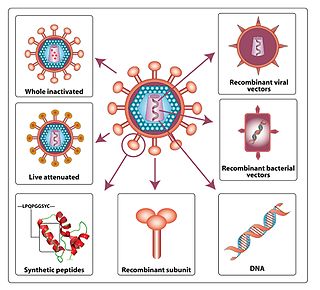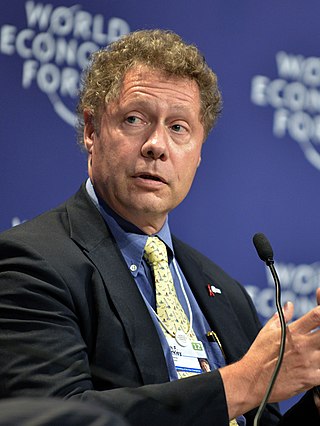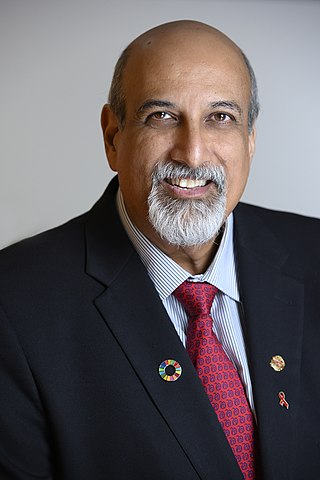
The Joint United Nations Programme on HIV and AIDS (UNAIDS) is the main advocate for accelerated, comprehensive and coordinated global action on the HIV/AIDS pandemic.

An HIV vaccine is a potential vaccine that could be either a preventive vaccine or a therapeutic vaccine, which means it would either protect individuals from being infected with HIV or treat HIV-infected individuals.

The United States President's Emergency Plan For AIDS Relief (PEPFAR) is a United States governmental initiative to address the global HIV/AIDS epidemic and help save the lives of those suffering from the disease. Launched by U.S. President George W. Bush in 2003, as of May 2020, PEPFAR has provided about $90 billion in cumulative funding for HIV/AIDS treatment, prevention, and research since its inception, making it the largest global health program focused on a single disease in history until the COVID-19 pandemic. PEPFAR is implemented by a combination of U.S. government agencies in over 50 countries and overseen by the Global AIDS Coordinator at the United States Department of State. As of 2021, PEPFAR has saved over 20 million lives, primarily in Sub-Saharan Africa.
This is a list of AIDS-related topics, many of which were originally taken from the public domain U.S. Department of Health Glossary of HIV/AIDS-Related Terms, 4th Edition.
The European and Developing Countries Clinical Trials Partnership (EDCTP) is a partnership between the European Union (EU), Norway, Switzerland and developing countries and other donors, as well as the pharmaceutical industry, to enable clinical trials and the development of new medicines and vaccines against HIV/AIDS, tuberculosis, and malaria. The need for global action against these diseases in order to promote poverty reduction has been recognised by the United Nations, the G8, and the African Union, and the program envisioned the provision of €600 million for the period 2003–2007 in order to translate medical research results into clinical applications relevant to the needs of developing countries.
The Division of Acquired Immunodeficiency Syndrome (DAIDS) is a division of the National Institute of Allergy and Infectious Diseases, which is part of the National Institutes of Health. It was formed in 1986 as a part of the initiative to address the national research needs created by the advent and spread of the HIV/AIDS epidemic. Specifically, the Division's mission is to increase basic knowledge of the pathogenesis, natural history, and transmission of HIV disease and to support research that promotes progress in its detection, treatment, and prevention. DAIDS accomplishes this through planning, implementing, managing, and evaluating programs in (1) fundamental basic research, (2) discovery and development of therapies for HIV infection and its complications, and (3) discovery and development of vaccines and other prevention strategies.

Awa Marie Coll-Seck is as Senegalese infectious diseases specialist and politician who served as Minister of Health of Senegal from 2001 to 2003 and again from 2012 to 2017. She also served as former Executive Director of the Roll Back Malaria Partnership and is on the board of directors of several notable global health organizations. She is an agenda contributor of the World Economic Forum.
World AIDS Vaccine Day, also known as HIV Vaccine Awareness Day, is observed annually on May 18. HIV vaccine advocates mark the day by promoting the continued urgent need for a vaccine to prevent HIV infection and AIDS. They acknowledge and thank the thousands of volunteers, community members, health professionals, supporters and scientists who are working together to find a safe and effective AIDS vaccine and urge the international community to recognize the importance of investing in new technologies as a critical element of a comprehensive response to the HIV/AIDS epidemic.

Seth Franklin Berkley is an American medical epidemiologist, the CEO of Gavi, the Vaccine Alliance and a global advocate of the power of vaccines. He is the founder and former president and CEO of the International AIDS Vaccine Initiative (IAVI).

The Vaccine Research Center (VRC), is an intramural division of the National Institute of Allergy and Infectious Diseases (NIAID), part of the National Institutes of Health (NIH), US Department of Health and Human Services (HHS). The mission of the VRC is to discover and develop both vaccines and antibody-based products that target infectious diseases.

Geeta Rao Gupta is a leader on gender, women's issues, and HIV/AIDS who has been serving as executive director of the 3D Program for Girls and Women and senior fellow at the United Nations Foundation since 2017. She is frequently consulted on issues related to AIDS prevention and women's vulnerability to HIV and is an advocate for women's economic and social empowerment to fight disease, poverty and hunger.
Barton Ford Haynes is an American physician and immunologist internationally recognized for work in T-cell immunology, retrovirology, and HIV vaccine development. Haynes is a Frederic M. Hanes Professor of Medicine and Immunology at Duke University Medical Center. He is the director of the Duke Human Vaccine Institute and the Duke Center for HIV/AIDS Vaccine Immunology and Immunogen Discovery (CHAVI-ID), which was funded by the National Institute of Allergy and Infectious Diseases (NIAID) in 2012. In addition, Haynes directs the B-cell Lineage Envelope Design Study, the Centralized Envelope Phase I Study, and the Role of IgA in HIV-1 Protection Study as part of the Collaboration for AIDS Vaccine Discovery (CAVD), which was funded by the Bill and Melinda Gates Foundation in 2006.
The United States Military HIV Research Program was initiated by the United States Congress in 1986, in reaction to the threat of lost effectiveness of U.S./Allied troops due to HIV infection. The mission of MHRP is to develop an HIV-1 vaccine, provide prevention, care, and treatment, and conduct meaningful HIV/AIDS research for the global community through the President's Emergency Plan for AIDS Relief (PEPFAR). It is centered at the Walter Reed Army Institute of Research (WRAIR), and has established five international research sites in Africa and Asia. MHRP also partners with the Armed Forces Research Institute of Medical Sciences (AFRIMS) in Thailand. MHRP works closely with The Henry M. Jackson Foundation for the Advancement of Military Medicine (HJF), most notably in the development of the RV144 HIV vaccine in Thailand. MHRP is the largest research program supported by the HJF.
Global Health Initiatives (GHIs) are humanitarian initiatives that raise and disburse additional funds for infectious diseases – such as AIDS, tuberculosis, and malaria – for immunizations and for strengthening health systems in developing countries. GHIs classify a type of global initiative, which is defined as an organized effort integrating the involvement of organizations, individuals, and stakeholders around the world to address a global issue.
The Global HIV Vaccine Enterprise is an alliance of organizations formed to accelerate the search for an HIV vaccine. Initially proposed in Science magazine in 2003 and developed by scientists, health experts and policy makers, the concept of the Enterprise received support from the G8 the following year. The primary aim of the organization is to provide leadership in efforts to reverse the AIDS epidemic. The organization, based in New York City, was founded by representatives from The Gates Foundation, NIH, WHO-UNAIDS, European Commission, Wellcome Trust, International AIDS Vaccine Initiative, French National Agency for Research on AIDS and Viral Hepatitis.
Asociación Civil Impacta Salud y Educación is a non-profit organization which promotes public health in the Andean region of Peru.

Agnes Binagwaho is a Rwandan pediatrician and co-founder and the former vice chancellor of the University of Global Health Equity (2017-2022). In 1996, she returned to Rwanda where she provided clinical care in the public sector as well as held many positions including the position of Permanent Secretary for the Ministry of Health of Rwanda from October 2008 until May 2011 and Minister of Health from May 2011 until July 2016. She has been a Professor of Global Health Delivery Practice since 2016 and a Professor of Pediatrics since 2017 at the University of Global Health Equity. She resides in Kigali.
SAV001-H is the first candidate preventive HIV vaccine using a killed or "dead" version of the HIV-1 virus.

Salim S. Abdool Karim, MBChB, MMed, MS(Epi), FFPHM, FFPath (Virol), DipData, PhD, DSc(hc) is a South African public health physician, epidemiologist and virologist who has played a leading role in the AIDS and COVID-19 pandemic. His scientific contributions have impacted the landscape of HIV prevention and treatment, saving thousands of lives

John N. Nkengasong is a Cameroonian-American virologist serving as the Global AIDS Coordinator in the Biden administration since 2022. He previously worked as the Director of the Africa Centres for Disease Control and Prevention from 2016 to 2022, as well as at the World Health Organization (WHO) and Centers for Disease Control and Prevention. During the COVID-19 pandemic, Nkengasong was appointed the WHO Special Envoy for Africa.










